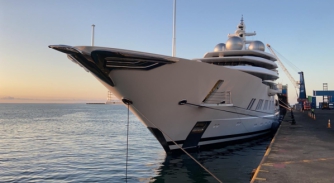How to make a fair presentation of risk
Hill Dickinson’s Francesca Conn and David Reardon dissect the Delos v Allianz case and explain what this means for superyacht insurance…

In this article, Francesca Conn, Legal Director and David Reardon, Partner and Head of Office of Hill Dickinson Monaco consider fair presentation of risk in the context of superyacht insurance and in the light of guidance given by the Court in Delos Shipping v Allianz Global case earlier this year.
The pair discuss one of the case’s pivotal questions: whether an insurer could deny a claim for the constructive total loss of a vessel under a war risks policy due to the insured's alleged failure to fairly present the risk. This issue itself centred on the non-disclosure of criminal charges against the director of the vessel's owning SPV. The Court ultimately rejected the insurer's defence on the facts but the judgment reminds us of the stringent requirements of the duty of fair presentation of risk from the policy’s outset.
For both Conn and Reardon, it is imperative for insured parties to fully and accurately disclose all material circumstances that could influence an insurer's decision to accept and underwrite the risk. Moreover, the judgment reminds us of the legal consequences of breaching this duty. If an insurer can demonstrate that disclosure of the material circumstance would have influenced their decision to underwrite the risk, they may avoid the policy or adjust the terms of coverage.
In Delos Shipping SA & Others -v- Allianz Global Corporate and Specialty SE & Others [2024] EWHC 719 (Comm), the Court recently dealt with an Insured’s claim for an indemnity under the war risks policy for the constructive total loss of its vessel. One issue that arose was whether the Insurer could deny the claim on the basis of an alleged breach of the Insured’s duty to make a fair presentation of the risk. In that case, the non-disclosure relied on was that the sole nominee director of the registered owner of the vessel (an SPV) was the subject of criminal charges in Greece. The Court rejected this defence on the facts of the case.
Insured’s duty to make fair presentation of risk and insurer’s remedy(ies) for breach
A superyacht insurance proposal form will require the would-be Insured to fill in boxes and answer numerous questions broadly relating to the Insured: its UBO; the superyacht and its tender and toys; the yacht’s use; crew and claims history.
The proposal form must be completed fully and accurately and honestly on behalf of the would-be Insured. Under English law, if the Insured is later found to have deliberately or recklessly provided incorrect information, the insurer can avoid the policy, and retain the premium.
Importantly, the Insurer’s express questions do not represent an exhaustive list of the information which the would-be Insured should and in fact must provide to the Insurer. All insurance policies which are subject to the laws of England and Wales impose a duty on an Insured to make “a fair presentation of the risk to the Insurer” (s. 3(1) Act 2015).
Fair presentation is defined as “disclosure of every material circumstance which the Insured knows or ought to know” and a circumstance is “material” “if it would influence the judgment of a prudent insurer in determining whether to take the risk and, if so, on what terms” (s. 7(3) Act 2015).
In layman’s terms, a material circumstance is something that prudent superyacht underwriters would have wanted to have had the opportunity to take into account when deciding whether or not, and/or on which terms, to write the risk for the superyacht and Insured.
If an Insurer can prove that, had the “material circumstance” been disclosed by the would-be Insured to the Insurer before the contract was entered into, then the Insurer would not have entered into the contract at all, or would have done so on different terms, then under English law the Insurer’s liability under the policy will be limited accordingly. Therefore, if the Insurer would not have entered into the contract at all, there is no cover. If the Insurer would have written the risk on different terms, those terms are the applicable terms for cover.
What is the “risk” to be fairly presented?
The Court in Delos Shipping stated that the risk to be fairly presented:
“clearly includes any circumstances which increase the risk being underwritten, for example, if it relates to the risk of loss of or damage to the subject matter of the insurance, the occurrence or effect of an insured peril, or to the insurer’s salvage or subrogation rights. However, it is well-established that materiality is not limited to such matters and can extend to matters relevant to the “moral hazard”, for example where the circumstances in question could result in a fraudulent or inflated claim.”
A superyacht owner should use an experienced specialist superyacht broker who is rigorous in seeking full relevant disclosures from its client, to help ensure that the Insured fulfils its duty to make a fair presentation of the risk.
It is important that the broker’s enquiries are not limited to information about the superyacht and are not directed solely to the Captain and its technical management team. The risk of breach of the duty to make a fair presentation of the risk in relation to “moral hazard” could relate to the superyacht’s ownership structure and, as a consequence, matters or information which may well be outside the knowledge of the Captain and technical team.
This does not mean that the broker’s enquiries are “digging for dirt” on the client and insured or searching for any skeleton in the superyacht UBO’s closet. Per the Court in Delos Shipping, material circumstances are:
“limited to circumstances which would influence the judgment of a prudent underwriter, since it is difficult to conceive of a prudent, as opposed to an excessively cautious, underwriter being influenced by matters which have no objective connection to either the insurer’s liability or potential loss under the policy or to the honesty or bona fides of the assured. This would make sense because the question is surely whether the underwriter is prepared to write the risk, not whether he or she likes the assured personally or wants further business from the assured in the future, or for reasons of personal antipathy will not underwrite vessels associated with anyone born in Ruritania.”
Meaning of material circumstances: “the Insured knows or ought to have known”
S. 4(3) of the Act 2015 states that a corporate assured (such as a yacht SPV) knows:
“only what is known to one or more of the individuals who are -
part of the insured’s senior management, or
responsible for the insured’s insurance.”
“Senior management” is defined as “those individuals who play significant roles in the marking of decisions about how the Insured’s activities are to be managed or organised”.
Knowledge includes matters that the above individuals suspect but deliberately refrain from making enquiries about.
An Insured ought to know “what should reasonably have been revealed by a reasonable search of information available to the Insured (whether the search is conducted by making enquiries or by any other means).” (s.4(6) Act 2015.)
In conjunction and consultation therefore with its superyacht broker, the Insured needs to make sure that material circumstances known or discoverable to the categories of persons relevant for a corporate Insured, are fully determined before presenting the risk to the Insurer.
When must “the risk” be fairly presented to the Insurer?
The duty to fairly present the risk applies pre-contract and up to the point of incepting the policy.
Under the Insurance Act 2015, there is during the policy period no ongoing obligation to disclose material information.
There are, however, in the superyacht H&M insurance market, policy terms that do require the Insured to make ongoing disclosures during the term of the policy. If an H&M policy includes such an onerous term, then this must be flagged up as an important warning by the broker.
Most superyacht H&M policies do have express disclosure obligations during the term of the policy in relation to hotworks; repair and refit; and entering any yard that requests a waiver of liability or waiver of subrogation.
Finally, unless the H&M policy automatically renews on its terms (and most do not), the duty of fair presentation of the risk re-arises at the point of every annual renewal i.e. when a new policy is to be incepted.
It is therefore crucial that prior to renewal the Insured and its superyacht broker carefully consider whether there are any new material circumstances that must be disclosed i.e. anything that might increase the risk of loss or damage or the occurrence or effect of an insured peril or present a “moral hazard.”
These might include:
-
Whether any changes have been made to the yacht and its toys and tenders;
-
Whether any changes are made or planned in respect of the superyacht’s use and operation/navigation;
-
Whether there are any concerns about the yacht’s safety and seaworthiness;
-
Whether the superyacht’s value is known to have changed, for example, if a valuation has been obtained for any purpose or if the superyacht has been listed for sale; and
-
Whether any criminal actions have been brought against the Captain, the insured or its UBO.
At The Superyacht Group, we pride ourselves on being the hub of expertise and insights for the superyacht community. If you have a topic you would like to explore and share with our professional network, we invite you to contact us at newsdesk@thesuperyachtgroup.com. Join us in contributing to the ongoing conversation and sharing valuable knowledge with industry leaders.
Profile links
NEW: Sign up for SuperyachtNewsweek!
Get the latest weekly news, in-depth reports, intelligence, and strategic insights, delivered directly from The Superyacht Group's editors and market analysts.
Stay at the forefront of the superyacht industry with SuperyachtNewsweek
Click here to become part of The Superyacht Group community, and join us in our mission to make this industry accessible to all, and prosperous for the long-term. We are offering access to the superyacht industry’s most comprehensive and longstanding archive of business-critical information, as well as a comprehensive, real-time superyacht fleet database, for just £10 per month, because we are One Industry with One Mission. Sign up here.
Related news

Unfair dismissal in the UK
Clyde & Co’s Heidi Watson discusses how a steward on a superyacht which never entered UK waters could still claim unfair dismissal in a British court
Crew

What does “choice-of-forum” mean for yacht insurance?
A recent US Supreme Court ruling on marine insurance policies has flagged numerous new legal considerations for American yacht owners
Owner

Is the auction above board?
With negotiations underway for Royal Romance to be sold at an American auction house, a Ukrainian law expert offers insights on the contentious move
Fleet

The value of the lawyer
The approach to seeking advice needs to evolve, as does the perception of a lawyer’s role within the decision-making process
Business

US aims to sell Amadea
Amadea could be sold by the US government as it looks to free itself from a seven-figure maintenance bill
Fleet

Assessing the risk factor
Where do the responsibilities lie between yacht builders and owners?
Owner
Related news
Unfair dismissal in the UK
2 years ago
Is the auction above board?
2 years ago
The value of the lawyer
2 years ago
US aims to sell Amadea
2 years ago
Assessing the risk factor
2 years ago
NEW: Sign up for
SuperyachtNewsweek!
Get the latest weekly news, in-depth reports, intelligence, and strategic insights, delivered directly from The Superyacht Group's editors and market analysts.
Stay at the forefront of the superyacht industry with SuperyachtNewsweek



